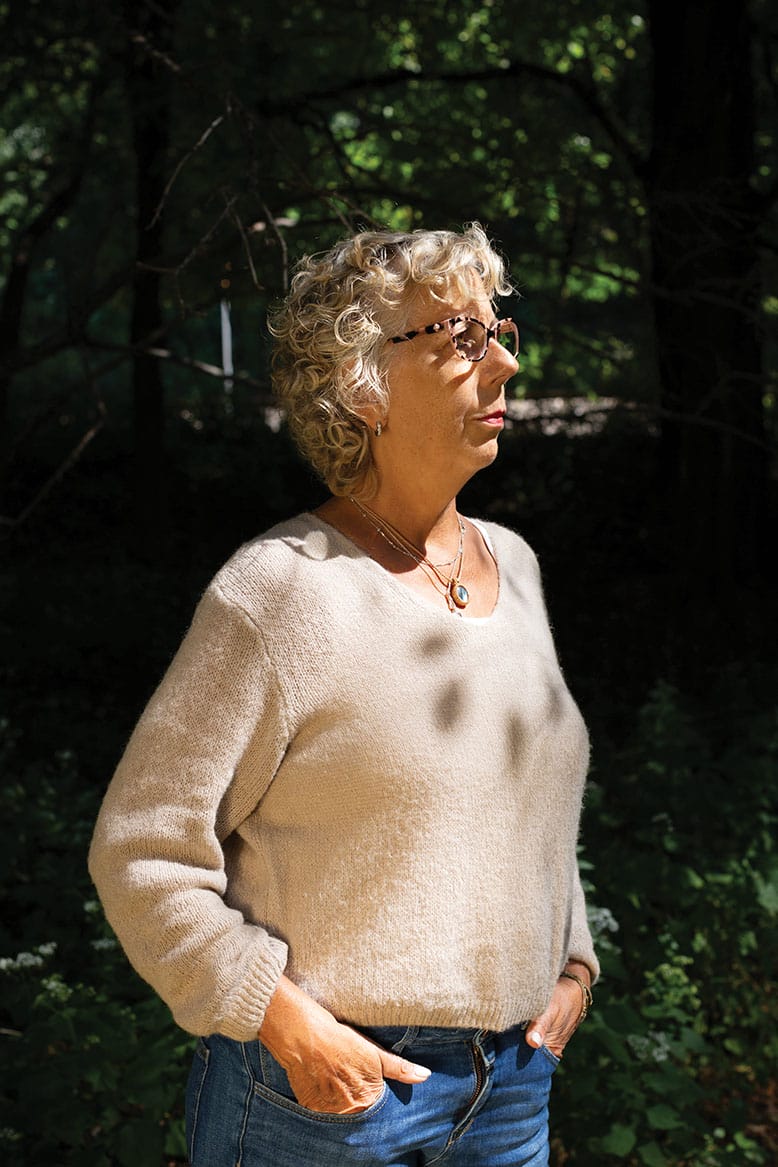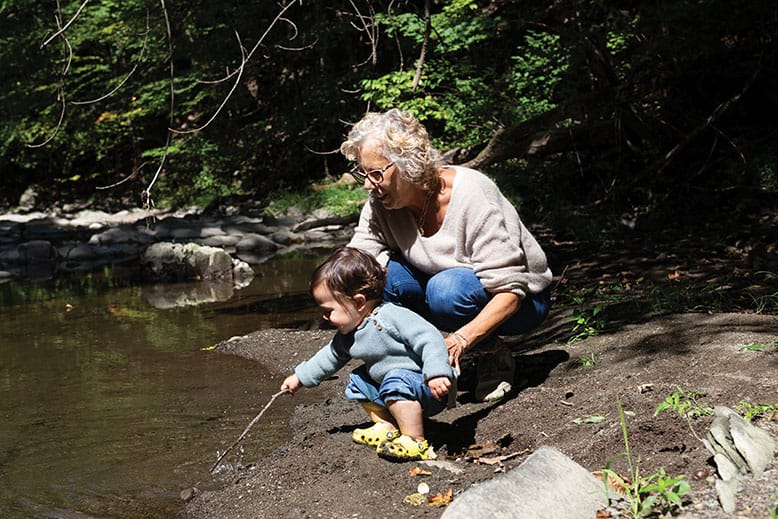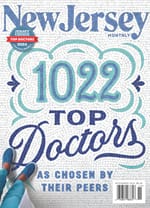
Photo: Ali Cherkis
It was November 2021, and a strange feeling woke me up in the middle of the night. I’d felt it a few times over the previous few weeks. It wasn’t pain, but it was noticeable. If my gastro doc hadn’t warned me of the potential for diverticulitis, I wouldn’t have given it a moment’s thought. “You’re fine,” I could hear my mom’s voice saying, resonating in my memory. “You have an overactive imagination.”
The odd pressure in my stomach persisted, so I scheduled a telemedicine appointment. My doctor recommended a CT scan, but said insurance wouldn’t cover it until we’d done other tests.
Seven weeks later, all tests were normal—until the CT scan. Early on the morning after the scan, as I was pulling out of the supermarket, my phone rang. “Hi Laura, it’s Dr. Okun. You sure are in touch with your body, and it’s good that you listened. There’s a very large tumor on your pancreas.”
The words did not register. I asked questions in my all-business voice, then called my husband to deliver the news in a tone as if I were telling him the store was out of eggs.
Eight days later, I was admitted to the hospital for a biopsy. “You know what this could be?” asked Dr. Shieh at Overlook Hospital.
When I woke up, I knew the news was bad. “We found cancer cells,” said the doctor. It was too much to take in. All I could say was, “Please call my husband,” which he did, walking briskly down the hall. I felt numb on the ride home to Bloomfield and asked my husband, Mike, to pull over at Holsten’s for a vanilla milkshake. At the kitchen table, we called our (grown) kids and cried.
My mom role shifted that day. I appeared newly mortal and could no longer reassure my kids that everything was going to be alright. The next morning, Dr. Okun called with excellent news: “You’re among the lucky few who catch pancreatic cancer early enough to be operable.”
I had plans to leave for Mexico in three days. Dr. Okun encouraged me to go. “Have fun,” he said. “You’re looking at a very long, difficult treatment ahead.”
After a six-hour flight and a three-hour drive, we turned onto a dusty, pot-holed road. Then the palm trees grew larger, the white sand more expansive, and the beach emptier than any I’d seen. As fast as an excited child, I was in my swimsuit on the beach. For a week, I swam in the ocean, slurped fresh ceviche, and drank from just-picked coconuts. Still, fear took over in the calm, dark quiet of night. There was no escaping what was going on in my body.
We arrived home at midnight and left the next morning at seven for my first appointment with an oncologist. The waiting room—full of hard surfaces—made me miss the gentle softness of the warm Mexican sand. Without shaking our hands, the doctor went to her laptop to review my case.
She seemed tired, under pressure, and impatient, as cold as her office. “This is a terrible disease. The chemo is among the hardest to tolerate. We won’t know if we can operate. No, you won’t be able to work.”
I was to follow a six-month chemo protocol before and after surgery.
“It’s just a number,” replied the surgeon when I asked him to explain the tumor-marker results in my blood test. It was a terrifyingly high number that caused me to fear there was cancer brewing elsewhere, if not everywhere.
TREATMENT JOURNAL
February 2022
■ My chest hurts thanks to the newly placed port I’ve named Portia, hoping that levity might make it easier. Tomorrow, the chemo regimen starts. I’m already learning how nurturing it is to slow down. To read during the day. (Jesus, how driven I have been!) To allow myself to be in the middle of a love sandwich: Mike upstairs playing music, my son Zack downstairs cooking, his wife, Nandi, tapping away on her laptop. The smells and sounds of love.
■ As I head to the first chemo appointment at MSK Montvale, Nandi suggests we meditate and asks me to repeat, “May I be well, may I be safe, may I be free from suffering.” In the car, Nandi and I sing along to the Laura’s Day mixtape she made. “We gonna be alright,” belts out Kendrick Lamar. “You got this,” she says as we open the car doors.
■ It is 10 degrees outside on that first infusion day. I’ve been warned that one of the chemo drugs causes a tremendous sensitivity to cold. By the time I get home, I am having trouble swallowing and am afraid my throat is closing. My first lesson in managing cancer panic: Read the handouts, call for help, close your eyes, and breathe deeply.
■ I try to adjust to the tube coming out of my chest that’s attached to a little plastic bottle in a fanny pack I wear around my neck. It contains drugs that will continue to drip into my veins for the next 48 hours, while I’m at home. A visit from friends bearing a gift—a soft-as-snow white blanket—helps me shift from dread to gratitude. I retire to my “healing perch” on the couch, where I write and read, accept cups of tea, and greet visitors.
■ I feel supported and loved, but I’ve never felt so sick in my life. Can’t wait to get detached and take a shower. I feel pressure to reply to all the messages. I’m overwhelmed and just want to sleep.
■ Horrible side effects from Oxaliplatin. I’m freezing, I can’t touch anything cold, and nothing tastes right. I’m exhausted, and it hurts to swallow. A pattern emerges: I get chemo on Monday, hunker down at home with my fanny pack, return Wednesday to have it detached, slowly feel worse for a few days, and then slightly better, until two weeks later, when it repeats.
The more important pattern that emerges is that I am never alone and will not face this alone. How lucky am I to have a best friend who is a doctor, my incredible hubby, and the kids: Zack has educated himself on pancreas cancer and Nick on precisely how I like my tea (ginger turmeric, with one teaspoon of honey), which they serve with a sweet little dish for the teabag.
March
■ The second chemo infusion is hard. Nick takes me. We don’t leave Memorial Sloan Kettering Bergen until 8 pm, after almost seven hours. My reaction to the new drug is bad, and it scares Nick. Terrible neuropathy, leg cramps and shaking. The chemo bag leaks that night and corrodes the fanny pack. What the hell is in these drugs?
■ A lot of friends want to visit, and I learn to keep it short or say no. I just want to be alone or with family.
■ Mike’s birthday is spectacular. The kids cook Mexican food and play music. I’m going to bed with a full heart. How blessed am I? Pinch me.
■ My friend David comes over to give me a back rub. Bob and Janice drop off delicious chicken shwarma. I never knew Bob could cook! This community is holding me up.
■ I wake up feeling down. Really need exercise. I go for a walk in the park, make it over a mile. Rush back to have diarrhea. I’m tired of feeling so tired. This is starting to get to me.
April
■ I am so sick of this. I want my life back. I go down an internet rabbit hole. How do I live with this hanging over me? I need to get out in nature. Now. Please let me survive.
May
■ What have I learned? Show compassion to self, reflect compassion to others. I’ve been way too critical and hard on myself.
■ I want to make art about beauty and pain and suffering. More time creating, away from screens. To hell with the tremor—I can still draw!
■ It’s Memorial Day weekend. We’ve opened the upstate cabin for the season, and it’s beyond glorious. I can’t wait to get my hands into the soil.
June
■ The cancer antigen is up. The tumor has barely shrunk. More chemo? Surgery? I’m terrified. I want to live. Please. Let me see my grandchildren. I want to frolic in the woods and play with them in the pond at my home upstate.
■ Does a life ever feel complete? I’m not done. I decide to reach out to the counseling services offered by MSK, and again get an appointment with the top dog. (My surgeon is chief of surgery.) Do I have a guardian angel? “An uncertain future gives you the opportunity of participating in creating the future you want,” says the psychiatrist. I feel a connection to this doctor. He’s warm, open, brilliant. The kindest cancer doc I’ve met. We talk about his Holocaust-survivor parents, about a good life and a good death. He comforts me with stories of long-term pancreatic cancer survivors and makes me feel special.
■ Seeing the surgeon today. Have never been more anxious. Please, God, let there be good news. I’m so scared the chemo has not been effective. Dying to move on to surgery and get this done! I love my friends. I love my life. I want to keep it. Please, just a little longer.
■ Surgery is scheduled. Five days before the big day, my phone rings. “Hi Laura, it’s Dr. Drebin,” the surgeon says. “The tumor board recommends we postpone surgery for another six rounds of chemo with a different drug. They don’t like the tumor-marker number.” I feel like I’ve been gut punched. So many plans have been put in place, and I am ready. I remember my instructions to “be flexible.” To breathe. To let go.
July
■ I have the third of six new chemo treatments, and my hair is falling out. We’re upstate. I’m sitting by the water. On a gorgeous summer day, I bring a chair out to the deck, and Mike plugs in the razor. He’s tentative at first, afraid of hurting me. After a few rows, he relaxes and gets into the rhythm as naturally as the musician he is. The shaving feels intimate, almost sacred. My brother David—visiting from California—takes me shopping for scarves. Another friend drops off silk pillowcases to keep my naked head comfortable. I’ve heard, “Is there anything I can do?” so often and realize it’s not just me who feels powerless.
August
■ I have the fifth chemo. My hands and feet are numb, and I’m bald.
September
■ Surgery is in three days. My feet have lost all feeling, and I’ve broken my toe. I’m trying to stay calm. Friends have been phenomenal. So many texts arrive during the days leading up to the surgery. My best buds are planning a group meditation for the night before. On the day of the surgery, we wake up at 3 am and breeze our way through the Lincoln Tunnel while listening to the beautiful song “Home” that our friends Doug and Iris performed and recorded for me.
From the hospital
■ Surgery is early Thursday morning. I sleep the entire day afterward. My stomach is enormous, with over 100 stitches across it. The care here is incredible. They find fluid around my lungs, supposedly normal. Cathy Chapman, my best friend since seventh grade together in Englewood and now a doctor in Boston, is here holding my hand through it all. I’m beyond grateful for her.
■ I am rarely alone. Mike, Zack, Nandi, Cathy and Nick, who drove all the way from Chicago, are all rotating visits. My roommate has not had one visitor. So many people are alone.
■ Wearing street clothes for the first time in over a week, bags packed, medications filled, ready to head home. Dr. Judge comes in with some paperwork. “I thought you’d like to see this. The pathology report is in. The margins are negative. You’re cancer free!” How could I be so lucky? The sun hits my face when I am escorted out of the hospital. I look up, extend my arms, and yell, “Sky!”
■ A meal train is initiated, even though I can barely eat. I create a “love board” in my art studio, posting notes, photos, cards and flowers, with a picture of my family in the center, the core of my universe of love.
Late September
■ It’s close to a year since this nightmare began. Surgery feels like a vague memory. This, my dear, is your second chance. What do I want? In many ways, I already have it. A life of kindness, a contemplative and creative life. When I tell my surgeon I owe him my life, he says we can’t celebrate yet. “When can we celebrate?” I ask. “In five years. If you make it five years, we’ll consider you cured. You’ve cleared many tough hurdles, but you’re not at the finish line.”
October
■ I was so much happier a few days ago. I guess I thought I’d beat this cancer thing. I’ve lost the motivation to keep my chin up. It’s been so much.
■ My recovery routine: meditate, yoga, shower, walk, chat, rest. Write, read and create. Stay off damn social media! This experience has helped me realize there is no finite amount of space to love.
■ We haven’t been upstate in six weeks. It’s fall, just slightly past peak, and glorious. I’m surrounded by beauty, but I keep having bad dreams. Riding my bike through rough terrain. Water rising. Floods. Fear.
November
■ It’s the Monday after Thanksgiving. My incision is hurting. It’s hard not to think about my health: my incision, my digestion, my tingling feet, my tremor. I worry: Will I see 20 years from now? Ten? Five? Sweet Mike says he does not want me to feel any pressure to earn money. I set up an analog area in my studio but using my hands is hard. My fine motor skills have gone to shit.
January 2023
■ Today is my first scan post-surgery. I’m surprised at how scared I am. I don’t want to muster up the fortitude for coping. But I sense a softer, more vulnerable self now. Is that how cancer has changed me? I let myself have a cookie for breakfast.
■ I’m scared, but I am not alone. And now—six months post-surgery—everyone comments on how healthy I look. Such a bleak cancer diagnosis causes an internal earthquake. But I have learned from the jolt. The kindness I have been shown is so profound, I’ve learned that love is the critical ingredient to healing.

Laura Baer, 67, spends time with her grandson, River, out in nature. Photo: Ali Cherkis
ADDENDUM
The January 3, 2023, scan was good, and I was elated and in the mood to celebrate. I thanked my family with a week in Mexico. Nandi was pregnant, I was cancer free, and we felt like the luckiest people on Earth.
I waltzed in for my second April appointment at MSK, and the doctor handed me the scan report with a big yellow highlight. “There’s a spot on your lungs. You need a biopsy immediately. We’ll get you back on chemo,” he barked.
“And then I’ll be OK?” I pressed.
“No, but we’ll buy you time.”
I was in a daze. How naive I had been! This is pancreatic cancer, after all. How stupid I was to take everything off the “love” board and put it in a box for safekeeping, as if I could make this part of my past.
So back into the hospital I went. I was worried. Nandi and Zack’s baby shower was coming up. The night before the party, the doctor called. “I have great news! The biopsy showed a fungal infection. You are cancer free!” I collapsed on the floor with relief.
But a month later, I was awakened by waves of abdominal pain. A scan showed a partial bowel blockage, and I was admitted to the hospital to have a stent put in my colon.
The cancer had returned, and, in a pattern consistent with pancreatic cancer, had invaded the peritoneum and pushed against a wall in my colon. My cancer-free period was over.
“How long will I have to be back on chemo?” I asked.
“For the rest of your life—months, not years. Gemcitabine generally works for six months.”
I’m in my 17th month of treatment now—well over a year! Cathy says, “Don’t think about the averages. You’re not average,” and Nick says that I’m “tough—tough as nails.” Everyone says I’m an inspiration. The flattery is nice. I’m trying to live my life free of fear.
I’ve stopped sweating the small stuff, stopped doing things I don’t want to do, and work hard not thinking too far ahead. Our motto: “Nothing but fun.”
This I know for sure: Soon I will be playing by the water’s edge upstate with my grandson, River.
Laura Baer is an artist, designer and photographer who was the creative director of New Jersey Monthly from November 2013 to June 2021.
No one knows New Jersey like we do. Sign up for one of our free newsletters here. Want a print magazine mailed to you? Purchase an issue from our online store.



